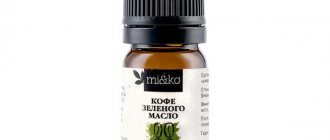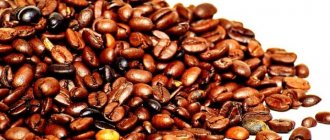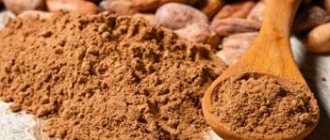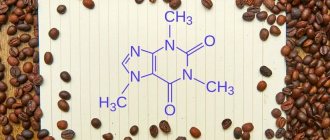Hello, my dear readers! Today we will talk about coffee. Everyone has heard about this legendary drink with a centuries-old history. And many, like me, cannot imagine a day without a cup of aromatic coffee.
Recently I started thinking about whether we use this drink correctly? Knowing about the harm sugar has on the body, I decided: it’s worth studying and reconsidering my attitude towards drinking coffee. After all, you want not only to have fun while drinking this magical drink, but also not to harm your health.
So, is coffee without sugar good or bad? And is it possible to cook it healthy and tasty?
Caffeine, by the way, helps reduce appetite and speeds up the process of calorie consumption. If you drink up to 3 cups of coffee a day, you will not gain extra pounds. But excessive consumption can lead to liver problems, auditory hallucinations and even epileptic attacks.
Therefore, choose a middle ground; try not to drink coffee after 14.00.
Coffee
Firstly, coffee (tea) should not be combined with meals! This is a complete snack. If you like coffee, drink it instead of your first or second snack (between breakfast and lunch or lunch and dinner). At the same time, you should not eat something else as a bite, since this drink itself (especially with milk) is already food.
Article on the topic
So that the energy does not leave: recipes for invigorating drinks
Secondly, coffee retains fluid in the body. You can drink it if you really want it, but with 0.5% low-fat milk and up to 3 cups a day. If we are talking about latte, it is better to limit yourself to 1-2 cups.
About green coffee
A new trend of our time is the appearance of green coffee on the shelves.
Unlike regular coffee, these beans are not roasted during production. It is believed that such coffee is healthier (contains antioxidants) and has more pronounced stimulating properties. During frying, some of the substances are destroyed. Here they are preserved in the quantities in which they were originally provided by nature. But this is ideal. In practice, during the production of instant green coffee, some substances are lost, since the technological process involves the use of elevated temperatures and pressure (powdered and granulated coffee). A greater amount of nutrients is preserved when making freeze-dried coffee. In this case, the decoction of grains is frozen and dried under vacuum conditions.
It is believed that green coffee contains less caffeine than roasted coffee. But that's not true. Caffeine is an alkaloid. It remains virtually unchanged during heat treatment (roasting). That is, as much of it was in green coffee, so much of it went into roasted coffee.
Green coffee does not have the usual coffee taste and aroma. Therefore, many manufacturers use all kinds of additives - they create both coffee mixes and various “fruit” drinks based on green coffee.
Improve your coffee
Try a unique recipe by adding a little unsalted butter to a cup of freshly brewed coffee. It will provide a soft, enveloping creamy taste, soften the bitterness and allow the coffee bouquet to better reveal itself. The oil has a beneficial effect on the gastrointestinal tract, increases the level of “good” cholesterol and reduces the amount of dangerous triglycerides.
Americans call this drink “bulletproof.”
Coffee with butter is a good alternative to a hearty breakfast for those who can’t even think about food in the morning. A cup of hot, creamy drink will give you a feeling of satiety, invigorate you and be a great start to your working day.
What kind of coffee is prepared with sugar?
Most often, the advice to add sugar before cooking is found in recipes for Turkey. And this is understandable: the traditional Turkish grind is very fine, the coffee takes a long time to brew and is brought almost to a boil - accordingly, there will be a lot of caffeine (and therefore caffeine bitterness) in such a drink. Sugar, as we remember, successfully neutralizes some of this bitterness.
You can make caramel coffee in a Turk: to do this, you first need to melt sugar with a small amount of water in a Turk until it becomes syrup (stirring so that it does not burn), and then add water and ground coffee and cook as usual.
Another (almost) traditional coffee recipe, which is prepared immediately with sugar, is raf. This drink is intended as a dessert drink, so according to the classic recipe, add two tablespoons of sugar at once - vanilla and regular - and beat cold cream, espresso and sugar together. For raffa, it is better to use very fine sugar to maintain the texture of the drink.
If you are making cappuccino and want to add sugar to it, it is better to mix it with espresso rather than milk. Firstly, it will dissolve faster in hot espresso, and secondly, without sugar it is easier to froth the milk, achieving the perfect foam.
How to reduce the harmful effects of coffee on the body
- If you suffer from hypertension or increased nervous excitability, choose decaffeinated coffee. But you can’t get carried away with this kind of coffee either, because... the substances contained in it (including unstudied ones) may have a stimulating effect.
- Don't drink coffee at night if you have insomnia.
- If you suffer from diabetes, drink weak coffee without sugar. But no more than 1-2 mugs per day.
- If you have high levels of cholesterol in the blood, a tendency to atherosclerosis, or diseases of the cardiovascular system, use paper filters in coffee makers. Reduce the frequency of drinking instant coffee, because... it also contains cafestol, which increases cholesterol levels.
- If you have high stomach acidity or hyperacid gastritis, do not drink coffee on an empty stomach, try to avoid black strong coffee. After all, coffee will further increase the acidity of gastric juice, which can lead to ulcer formation. If you cannot resist coffee, prefer it with added milk.
- If you are prone to obesity, do not add a lot of sugar, syrups, ice cream and large amounts of milk to your coffee.
- Be sure to follow a water-drinking regime to avoid pathological reactions of the body associated with dehydration.
- To avoid leaching calcium and microelements from the body, monitor the variety of your diet and do not neglect the consumption of dairy products.
- If you are pregnant, it is better to stop drinking coffee or limit it to a few cups per month.
- To be more confident in the benefits of the drink for your health, give preference to grain coffee (if there are no contraindications) rather than instant coffee. In this case, you can avoid consuming various flavoring and aromatic additives used in production. In addition, when purchasing coffee beans labeled “Eco,” you can be sure that both the farmers and the importer are trying to avoid the use of pesticides and toxic chemicals along the entire path of the grain from the coffee tree to your coffee grinder.
Benefits of coffee
- Coffee beans contain the alkaloid caffeine, which has a psychostimulating effect. Both the benefits and harms of coffee are associated with it. The benefit is to stimulate the nervous system and cardiac activity, thereby increasing performance and increasing blood pressure (which is good for hypotensive patients).
- Drinking coffee helps prevent type 2 diabetes. This is due to the content of chlorogenic and caffeic acids, as well as caffeine. These 3 substances inhibit the accumulation of amyloid protein, which contributes to the development of non-insulin-dependent diabetes mellitus.
- Coffee prevents the development of Parkinson's disease. Scientists noticed this connection in a practical way, noting that decaffeinated coffee does not prevent this disease (by the way, this effect was more pronounced in men).
- Prevention of stroke and cardiovascular diseases occurs due to the dilation of blood vessels in the brain and heart under the influence of caffeine.
- Substances contained in coffee increase gastric secretion - they increase the acidity of gastric juice. This property is useful for patients with gastritis with low acidity.
- Coffee is believed to help combat depression. Moreover, in women this effect is more pronounced.
- According to American scientists, drinking coffee reduces the risk of developing alcoholic cirrhosis of the liver. Scientists suggest that this effect is not due to caffeine, but to another unstudied substance.
How to sweeten coffee without sugar
If you like to enjoy a cup of coffee in the morning, it may take some time for you to adjust, but it will be worth it.
Enjoy your coffee without sugar and use these instead:
Using dates to sweeten your coffee also helps you get some extra magnesium, fiber, and vitamin B6.
To flavor coffee with dates, use date paste and experiment with it to find your desired sweetness.
Making date paste is very simple - soak a few stone Medjool dates in water for an hour, then mix the dates with a tablespoon or two of the water used to soak them. Blend until it makes a soft paste and mix some into a freshly poured cup of coffee.
Honey with coffee
You've probably added honey to your cup of tea, but have you ever thought about putting honey in your coffee? Honey's natural antibacterial properties can also make it an excellent substitute for most sweeteners.
The strong flavor of honey means a little goes a long way, so try using half or even one-quarter the amount of sugar you would use. You can also experiment with different types of honey—darker honey often has a stronger flavor, so keep that in mind.
Sugar in drinks - pleasure or harm
First you need to remember that natural grains are brewed to invigorate and wake up in the morning. This effect is caused by caffeine - it forces the brain to work in an active mode using complex chemical reactions between substances.
There is another side to the coin - the brain needs glucose to work, or performance will gradually decrease. Those who drink coffee without sugar know that sometimes the drink causes the opposite effect - fatigue and drowsiness appear.
This is due to the production of glucose resources in the body and the inclusion of an economy mode. That is why in the East they explained a long time ago why coffee should be drunk with sugar. This is the first theory.
According to another version, glucose blocks the breakdown of fat, since the brain receives the necessary energy and does not need additional reserves. For people with excess weight problems, it is better not to add refined sugar to the drink or do it in minimal dosages - only to remove excess bitterness.
There are other situations: for example, in weight loss programs that include a low-calorie diet and exercise, you need to remove all excess calories. Most of them provide sweet and flour dishes.
At the first stage, you need to switch the body from nutrition to internal fat reserves. During this period of time, both increased drowsiness and excitability may be observed due to the fact that the brain has not yet figured out where to get its nutrition.
Fortunately, the body is designed in such a way that it is able to generate energy from fat, connecting other chemical reactions to convert it into glucose. But it takes time to start this process, since new neural connections must be formed in the brain.
Drink coffee only in the morning
It is advisable not to drink caffeinated drinks after 2 pm. In the morning you can drink 2 or 3 cups at intervals of a couple of hours, the last one will successfully complete your lunch. Caffeine will invigorate, increase performance, and improve digestion after a heavy meal.
In the afternoon, drink decaffeinated coffee, herbal teas, fruit drinks, juices and just plain water. This simple habit will help maintain your sleep pattern: by evening, caffeine will be eliminated from your body, and you will be able to get a good night's sleep.
What's the healthiest sweetener?
These sugar alternatives can help flavor or sweeten your coffee, but you may be wondering which one is best for you.
Everyone's taste buds are different, so it's all about what works for you and your lifestyle. It is important to remember that any sugar alternatives or sweeteners should be used in moderation.
Calorie content of coffee with spices
If you add spices to your coffee drink, be prepared that even 1 gram of calories can increase significantly. The table shows the number of calories in 1 gram of spices, this is about half a teaspoon, without a slide, or 2-3 pieces of spices.
Calorie table of popular spices in coffee
| Spices and seasonings | kcal in 1 g. |
| Cinnamon | 2,5 |
| Carnation | 3 |
| Nutmeg | 5 |
| Dry ginger | 1 |
| A piece of fresh ginger | 3,5 |
| Vanilla | 3 |
| Cardamom | 3 |
Why is sugar added to coffee?
The tradition of drinking coffee with sugar did not appear out of the blue; it is largely due to biological reasons. The human body reacts positively to sweet taste - it is subconsciously associated with something nutritious and high in calories. There is a lot of sweetness in fruits and honey, in root vegetables such as beets and carrots, and in milk. Sugar is instantly absorbed and provides a quick burst of energy.
On the contrary, the sour and bitter tastes that we find in every cup of coffee are not perceived so clearly by the receptors. We love sour things combined with sweet things. Thus, the taste of tangerines is determined by the balance of sugars and citric acid, and to assess sweetness, the sugar-acid coefficient can be used - the ratio of sugar content on the Brix scale to the acid concentration. We don’t like sour without sugar, associating it with unripe or fermented. Bitterness is completely subconsciously perceived as something poisonous that can be poisoned. In coffee, caffeine is responsible for the bitterness (but it also provides an invigorating effect, for which many people drink this drink) and chlorogenic acids - you can learn more about them in the article “Bitterness in Coffee: What It Happens and Where It Comes From.” Sugar, milk and other additives help offset the bitter taste and make the drink more palatable.
Interestingly, sugar in coffee not only dampens the bitterness, but also enters into a chemical reaction with caffeine molecules. This was proven by Dr Seishi Shimizu, a scientist from the University of York - his research was published in the journal Food & Function. Sugar added to the drink causes caffeine to dimerize. In simple terms, caffeine molecules “stick” to each other, trying to avoid contact with sucrose in water, so instead of every two caffeine molecules you get one double. Taste buds perceive each such dimer as one molecule, which means that the coffee tastes half as bitter.
Another argument in favor of sugar in coffee: scientists from the University of Barcelona claim that coffee with sugar has a positive effect on cognitive abilities. The combination of caffeine and glucose activates the parts of the brain responsible for maintaining attention and working memory. It turns out that if you drink coffee to cheer yourself up at work and become more productive, sugar will not be superfluous!
Should you drink coffee without sugar?
Did you know that refined sugars, such as white sugar, can be addictive?
Refined sugar actually affects your body in several ways. While weight gain is a common concern, the effects on your heart and liver should also be taken into account. Plus, there are those nasty blood sugar spikes and crashes to deal with, and I know no one likes them.
If you're trying to reduce refined sugar in your diet due to health concerns or because you're trying to lose weight, your daily cup of coffee is a great place to start. Reducing sugar from coffee can help reduce your intake.
Remember, you can still enjoy your coffee, just choose healthier alternatives to sweeten it!











